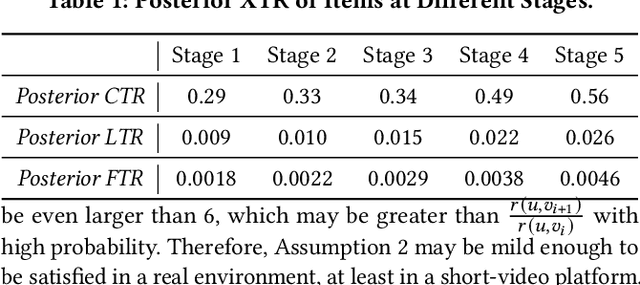Haijun Zhao
DimeRec: A Unified Framework for Enhanced Sequential Recommendation via Generative Diffusion Models
Aug 22, 2024Abstract:Sequential Recommendation (SR) plays a pivotal role in recommender systems by tailoring recommendations to user preferences based on their non-stationary historical interactions. Achieving high-quality performance in SR requires attention to both item representation and diversity. However, designing an SR method that simultaneously optimizes these merits remains a long-standing challenge. In this study, we address this issue by integrating recent generative Diffusion Models (DM) into SR. DM has demonstrated utility in representation learning and diverse image generation. Nevertheless, a straightforward combination of SR and DM leads to sub-optimal performance due to discrepancies in learning objectives (recommendation vs. noise reconstruction) and the respective learning spaces (non-stationary vs. stationary). To overcome this, we propose a novel framework called DimeRec (\textbf{Di}ffusion with \textbf{m}ulti-interest \textbf{e}nhanced \textbf{Rec}ommender). DimeRec synergistically combines a guidance extraction module (GEM) and a generative diffusion aggregation module (DAM). The GEM extracts crucial stationary guidance signals from the user's non-stationary interaction history, while the DAM employs a generative diffusion process conditioned on GEM's outputs to reconstruct and generate consistent recommendations. Our numerical experiments demonstrate that DimeRec significantly outperforms established baseline methods across three publicly available datasets. Furthermore, we have successfully deployed DimeRec on a large-scale short video recommendation platform, serving hundreds of millions of users. Live A/B testing confirms that our method improves both users' time spent and result diversification.
Full Stage Learning to Rank: A Unified Framework for Multi-Stage Systems
May 08, 2024



Abstract:The Probability Ranking Principle (PRP) has been considered as the foundational standard in the design of information retrieval (IR) systems. The principle requires an IR module's returned list of results to be ranked with respect to the underlying user interests, so as to maximize the results' utility. Nevertheless, we point out that it is inappropriate to indiscriminately apply PRP through every stage of a contemporary IR system. Such systems contain multiple stages (e.g., retrieval, pre-ranking, ranking, and re-ranking stages, as examined in this paper). The \emph{selection bias} inherent in the model of each stage significantly influences the results that are ultimately presented to users. To address this issue, we propose an improved ranking principle for multi-stage systems, namely the Generalized Probability Ranking Principle (GPRP), to emphasize both the selection bias in each stage of the system pipeline as well as the underlying interest of users. We realize GPRP via a unified algorithmic framework named Full Stage Learning to Rank. Our core idea is to first estimate the selection bias in the subsequent stages and then learn a ranking model that best complies with the downstream modules' selection bias so as to deliver its top ranked results to the final ranked list in the system's output. We performed extensive experiment evaluations of our developed Full Stage Learning to Rank solution, using both simulations and online A/B tests in one of the leading short-video recommendation platforms. The algorithm is proved to be effective in both retrieval and ranking stages. Since deployed, the algorithm has brought consistent and significant performance gain to the platform.
 Add to Chrome
Add to Chrome Add to Firefox
Add to Firefox Add to Edge
Add to Edge